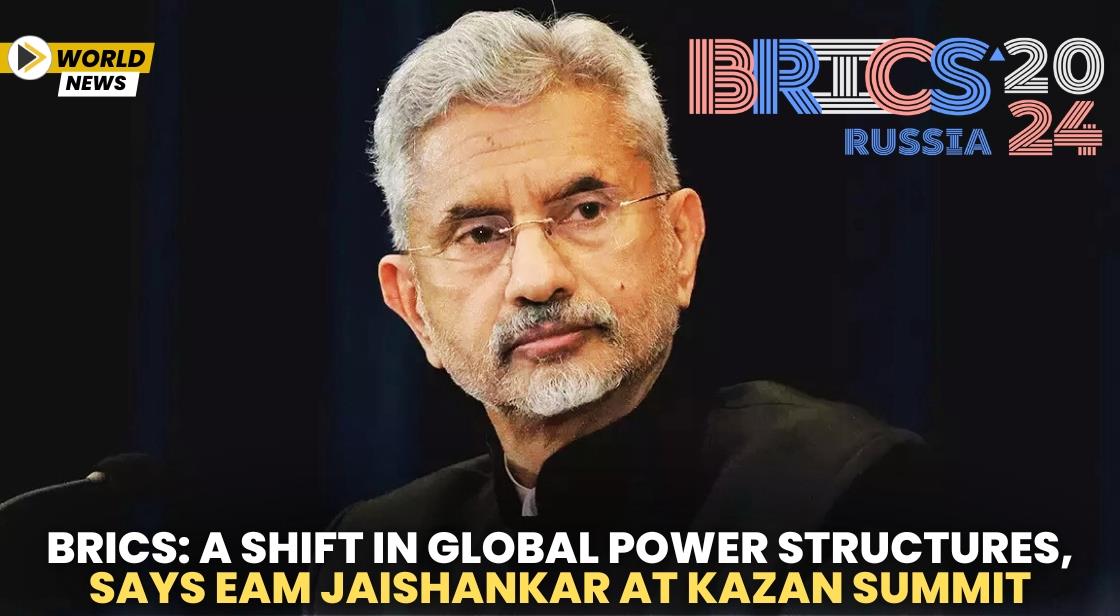BRICS: A Shift in Global Power Structures, Says EAM Jaishankar at Kazan Summit

News Synopsis
External Affairs Minister S. Jaishankar recently addressed the 16th BRICS Summit in Kazan, Russia, where he underscored the importance of the BRICS alliance (Brazil, Russia, India, China, and South Africa) in the face of shifting global power dynamics. According to Jaishankar, BRICS embodies a move away from outdated hegemonies and towards a multipolar world order that values inclusivity and empowers nations previously marginalized by colonial histories.
EAM Jaishankar: “BRICS is a Statement of Profound Change”
Jaishankar stated that BRICS is more than a geopolitical bloc; it symbolizes a seismic shift in the international order. He noted, "BRICS itself is a statement of how profoundly the old order is changing." He emphasized how this transformation stems from the remarkable achievements of nations emerging from colonialism, which have made rapid progress in developing socioeconomic infrastructures and honing talent, thus positioning themselves as substantial contributors to global stability.
Building Self-Reliant Global Platforms to Minimize Overreliance
External Affairs Minister S. Jaishankar highlighted the significance of creating autonomous global platforms to reduce dependency on existing superpowers, arguing that BRICS stands as a viable force for enabling change, particularly for the Global South. He expressed, “BRICS can make a significant difference by expanding independent platforms, widening choices, and minimizing undue reliance on systems that can be leveraged.”
India’s Stand on UN Security Council Reform
In an urgent appeal for reform, Jaishankar pointed out that global institutions, particularly the United Nations Security Council, must evolve to remain effective. He argued, “Reforming the UN Security Council, both in permanent and non-permanent categories, is essential.” According to Jaishankar, outdated practices within multilateral development banks also demand modernization, and he commended Brazil’s initiative in addressing these issues through its G20 presidency.
Democratizing the Global Economy through Decentralization
Jaishankar highlighted the necessity of democratizing economic practices by fostering decentralized production hubs worldwide. He referred to the vulnerabilities in global supply chains exposed by the COVID-19 pandemic, explaining that “more resilient, redundant, and shorter supply chains are essential to meet regional needs and strengthen production capabilities.”
Promoting Connectivity That Respects Sovereignty
Jaishankar took a critical stance on the colonial legacies embedded within certain global infrastructures, calling for inclusive connectivity solutions that honor each nation’s sovereignty and territorial integrity. “This must be a collective endeavor for the common good,” he added, advocating for global collaborations that respect national boundaries and shared interests.
India’s Initiatives: UPI, Gati Shakti, and Leadership in Global Alliances
Jaishankar cited India’s innovative programs, including the Unified Payments Interface (UPI) and the Gati Shakti infrastructure program, as possible blueprints for development models across BRICS countries. He also underscored India’s active participation in initiatives like the International Solar Alliance, the Coalition for Disaster Resilient Infrastructure, the Global Biofuel Alliance, and the International Big Cat Alliance. He emphasized India’s commitment to the role of a “First Responder in crises—whether natural disasters, health emergencies, or economic challenges.”
New Global Allies for BRICS and the Path Forward
At this year’s BRICS summit, leaders from Brazil, Russia, India, China, and South Africa met under the host leadership of Russian President Vladimir Putin, discussing various matters, including bolstering multilateralism, combating global terrorism, driving sustainable economic growth, and addressing pressing issues of the Global South. The summit saw an expansion in BRICS' influence with the inclusion of 13 new partner countries, emphasizing the bloc’s evolving role in the global landscape and its growing influence.
Key Points Summary
-
BRICS represents a shift from traditional power structures to a more balanced and multipolar global order, as emphasized by EAM S. Jaishankar.
-
The organization advocates for reducing dependence on major powers and promotes the creation of independent platforms.
-
Jaishankar calls for urgent reforms in global institutions, especially the UN Security Council, to reflect modern realities.
-
India continues to lead with initiatives like UPI and Gati Shakti while also supporting global alliances to address climate change and infrastructure resilience.
-
Thirteen new partner countries joined BRICS at the summit, marking its expanding influence and commitment to a fairer global order.
In conclusion, the 16th BRICS Summit, marked by EAM S. Jaishankar’s address, highlighted BRICS' evolving role in shaping a multipolar world order and empowering the Global South. Emphasizing the alliance’s commitment to reducing dependency on traditional power structures, Jaishankar called for an independent, resilient, and inclusive global framework that supports regional needs and respects sovereignty.
India’s own initiatives, from UPI and Gati Shakti to leadership in global alliances, underscore its dedication to a collaborative, equitable future. With the addition of 13 new partner countries, BRICS is not only expanding but is increasingly positioned to advocate for crucial reforms, sustainable development, and a democratized global economy, reflecting its growing influence in addressing 21st-century challenges.









